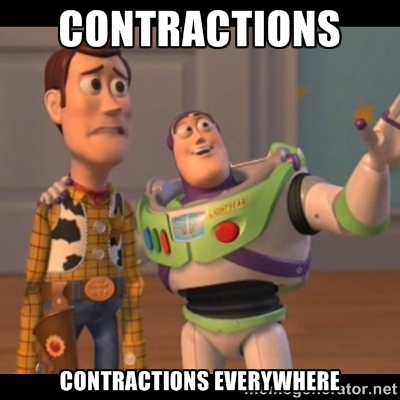Why should you avoid them? Slang can mean different things to different people, so it may not be comprehended the way that you intended it to be. Also, slang is very informal. It can show a laziness or a lack of effort by using slang. Lastly, it is boring! There are over a million words in the English language so I guarantee that you can find a more interesting word than a slang term.
1. “Like”
This word is bland, humdrum, and dull. There is absolutely nothing exhilarating about it. To say that you “like” something or your roommate likes something is meaningless. Great, who cares?! But if you or someone else really has an opinion, express it! Make sure that you use words to get the opinions and feelings across to the reader.
2. “Thing”
This is the least specific word in the English language. Your reader has no clue what you are referring to when you use it. Be specific!!
3. “Kids”
I remember my 6th grade teacher complaining about this word, and it has stuck with me. But I am not the only one that feels like this. They are “children,” “teenagers,” etc; give them some credit! Just choose a more specific and less demeaning word. (Unless, of course, you are talking about baby goats. Then, by all means, use “kids.”)

4. “Ripped off”
If your brother ripped off his shoes before jumping in a pool, go ahead and use this phrase. However, if your brother got ripped off because he was not given the correct change at the grocery store, use a different phrase. This is slang and sounds sloppy when it is used in a paper.
5. “Awesome”
This word is so overused that it has become almost as meaningless as “good.”
“Did you have an awesome time? Did you drink awesome shooters, listen to awesome music, and then just sit around and soak up each other’s awesomeness?” -Mean Girls
6. “Always/Never”
Really? Because I guarantee that someone could prove you wrong most of the time. Very few phenomenon always or never happens. So, use a more realistic term in your writing if there is a slight chance that it may actually happen.
7. “Good”
Pizza is good. A book is good. But if it is good enough for you to write a paper about, you should use a more descriptive and exciting word!

8. “Very”
This is often an over exaggeration and is used as a way to express an emotion that is not nearly as strong as you make it sound.
9. “The use of contractions”
This was one of the first rules I learned when I began writing. Do not use contractions. Let me repeat: NEVER USE CONTRACTIONS IN FORMAL WRITING! Contractions are a short cut. If you use a contraction in your paper, you might as well say to your professor that his or her paper is not worth your time to write out entire words.

10. “First, Secondly, finally, in conclusion, lastly,” etc.
Your readers can count. They know that it is the first paragraph or the second paragraph by counting the paragraphs. Also, they know you are concluding your paper because it stops after your paragraph. Do not tell them things that they can figure out on their own.
-Adrienne, Peer Tutor
It’s that time of year…

From pinterest.com
Pumpkin spice lattes, cozy knit sweaters, bonfires, and Halloween right around the corner.
But….it’s also scholarship/fellowship/grant application time! Though the Fulbright deadline was this past weekend, there are still other programs that are open. Maybe you have an application you’re working on, too!
If you’re a junior, then you may want to check into programs such as the Peace Corps, the Fulbright, and the Boren Award, as these are typically programs for after graduation. Check out the links at the end for more information about deadlines and what to prepare.
Over the past few months, I’ve settled on a research area and developed a proposal, finishing up this past weekend with all my final drafts. I’ve gone through probably a dozen twenty drafts of my statement of grant purpose and a generous handful of twelve drafts of my personal statement. I’d like to share with you a few things I’ve learned that may help you in these types of required writing.
What’s the first thing you should do?
- Read! Read all the information you can find about the scholarship, what you will be doing, and what you need to provide. You’d be surprised at how many times I had to read and re-read my Fulbright instructions to capture the multitude of requirements for each of the documents they need. Read carefully, take notes, and you’ll be in a great place to start writing.
- Next, if you have all (or even most) of the information you need to start composing your writing, jump on in. Start with a rough draft, aiming really only for getting your ideas on paper–you will go through countless revisions and drafts and change so much that you’ll really want to try not to think that your first draft will be close to perfect.
- Work on a lot of drafts, and ask your professors, if they’re writing recommendations, to review your documents with you. Come see us at the Writing Center, too! We’re here to help you through the entire writing process, even and especially for scholarship/fellowship/grant applications.
- Continue working and revising until you are completely satisfied with what you’ve written. For me, it felt like the process of writing my personal statement and statement of grant purpose took significantly more time than my average paper to complete. Plan to have enough time to work on it in between classes, in the evenings, on the weekends–whenever you can take thirty minutes, an hour, or some amount of time to review and revise.
Which reminds me…
- Make sure you check and double-check and triple-check your page lengths/word counts! The Fulbright requires a personal statement of one page and a statement of grant purpose under two pages. Likewise, the Boren Award has essay prompts that allow for 800 words or less. This is not a lot of space!
Like we say in the Writing Center, when you start your drafts of these documents, overwrite it first and edit out later.
Remember, when you get stuck trying to figure out how exactly to describe your passion or articulate why you want to study a certain language, you are always welcome in the Writing Center! Utilize the resources you have, ask a lot of questions, and finally:
- Take a deep breath. Relax for a moment. It will all be okay! These applications and all the deadlines are all very stressful, so make sure you keep yourself healthy and do your best to keep your stress levels in check.

From franklin.edu
We have faith in you!
Happy fall and happy application writing!
Here are links to some of the awards and applications for more information:
http://www.peacecorps.gov/apply/
http://us.fulbrightonline.org/
https://www.borenawards.org/
http://www.marshallscholarship.org/
-Emily

From fotosearch.com





